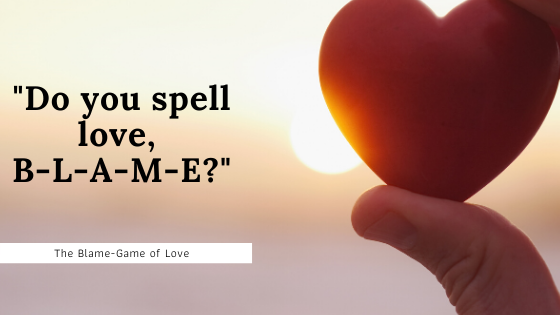
“You make me so happy!”
“I love the way you make me laugh!”
“You’ve given me the most amazing life!”
It’s nearly Valentine’s Day again, and for those 24 hours you’re going to witness – and possibly participate in – the world’s biggest blame game… the blame game most of us know as LOVE.
On Valentine’s Day the world over, people publicly declare their happiness and joy and how it’s all totally the fault of their beloved. Before this person came into their lives they were lost, sad and lonely. But then, they met ‘The One’ and now they’re happy and loved and it’s all completely, 100% their fault!
The nonsense that’s said on Valentine’s Day (and every other day in relationships) is because society teaches us that not only is it possible for someone else to make us feel happy and loved, but it’s the ONLY way we can feel happy and loved.
To not put too fine a point on it – what a load of hogwash.
When we blame others for our happiness, we inevitably blame them for our unhappiness too. When we’re running a business and we’re also married, this culture of blaming others for how we feel is a game that has very dangerous consequences. On this Valentine’s Day, I’ll share with you two ideas on love that will not only add value to your business, they will also add value to the most important relationship in your life… your relationship with yourself.
In 1992, Southern Baptist pastor Gary Chapman introduced his book “The 5 love languages”. If you’ve not read the book, it’s still likely you’ve come across the book’s key idea – that everyone has a primary Love Language. A Love language is a category of behaviours that a person most immediately associates with affection. The five Love Languages Chapman identified are quality time, physical touch, acts of service, giving and receiving gifts, and words of affirmation.
For nearly 3 decades this book has become a favourite with many as a guide to improve relationships. Over the years, millions of people have read the book and taken the test for the main purpose of determining their own love language. In my experience, this sets up two negative expectations. Firstly, that their primary love language is how their partner should demonstrate their love for them and secondly, that the reason they’ve felt moments of being unloved prior to knowing their primary love language was because their partner wasn’t showing their love in the ‘right’ way. For many, the interpretation is that for me to feel loved and valued, my partner is responsible for communicating their love for me in a way that I understand. In other words, it’s my partner’s fault when I feel loved and it’s also their fault when I feel unloved.
While it is important for us to understand what behaviours make us feel loved, Coleman’s main purpose for writing the book was to help us understand our loved one’s “love language” and shower them with that type of affection. So, for example, if you partner’s love language is quality time, according to Chapman the best way to express your love for them is to spend quality time with them. If it is physical touch, make sure you give them lots of hugs and kisses and hold their hand while walking down the street etc. Conversely if physical touch does not rate a mention then don’t be surprised if they push your DPA (displays of public affection) away. At the end of the day, Chapman’s work gives you the tools to create the conditions best conducive to another’s happiness, but you cannot actually make the other person happy – and vice versa for you.
My bigger consideration when it comes to the subject of love is that my “love” for another is a direct reflection of my “love” for myself. In other words, I can only love another person as much as I love myself. If I’m constantly berating myself, I will constantly berate others. If I’m always judging myself, I’ll judge others.
This Valentine’s day my invitation to you is to spend time with yourself, deepening your relationship with yourself. If your Love Language is giving and receiving gifts, go and buy yourself a gift. If it’s words of affirmation, begin the daily habit of reminding yourself of 10 things you appreciate about yourself. If it’s quality time, then clear out your afternoon and do that ‘thing’ that you just never seem to have enough time to do.
In some circles, self-love is considered selfish. My philosophy is that it is the starting point of loving others. You can only give to others what you have yourself. Just like you can’t keep taking money out of an empty bank account, you can’t keep giving love from an empty heart.
In my experience, the most common underlying reason why people don’t achieve their personal and business goals is that they don’t have enough self–love; they do not believe they are worthy of receiving; they do not believe they are good enough.
Use this Valentine’s Day to fall in love with yourself. Find out your primary Love Language and use that knowledge to deepen your own sense of self-love and self-worth. Shower yourself with words of affirmation, gifts and quality time. Start investing in your relationship with yourself and take responsibility for your own happiness. When you fully understand that the only person who can make you feel loved is you, you are released from the blame game most people know to be ‘Love’. You then have the freedom to love and accept yourself exactly as you are AND the gift of being able to love and accept your beloved in just the same way.
What does it take to actually remove yourself from the day-to-day grind of business? Learn from our panel of Business Owners who've Been There, Done That.